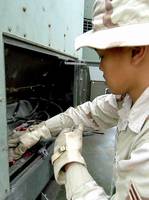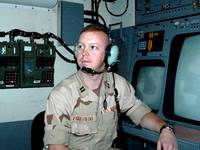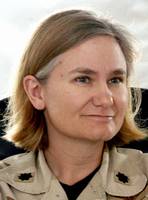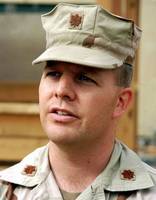By
Kent Harris,
Stars and Stripes
European edition, Thursday, April 1, 2004

Michael Abrams / S&S
Airman 1st Class Lawrence Genova of the 332nd
Expeditionary Air Control Squadron at Balad Air Base,
Iraq, pulls maintenance on a generator — an important
piece of equipment for expeditionary units deployed to
places where there is no electricity.

Michael Abrams / S&S
Capt. Erik Figueriedo, of the 322 Expeditionary Air
Control Squadron, sits inside an operations module used
for air traffic control at Balad Air Base.

Michael Abrams / S&S
Lt. Col. Kristen Dolan, commander of the 332nd
Expeditionary Air Control Squadron at Balad Air Base,
Iraq, and the 603rd Air Control Squadron at Aviano Air
Base, Italy.

Michael Abrams / S&S
Maj. Michael Krueger, director of operations for the
332nd Expeditionary Air Control Squadron at Balad Air
Base, Iraq.
|
BALAD, Iraq — The 603rd Air Control Squadron’s deployment
to Iraq has been far from typical.
Most Air Force personnel who deploy to Iraq do so
individually or in small groups. Not the 603rd, which sent
more than 100 airmen.
Most Air Force personnel are deployed for 90 days. Not
the 603rd, which left Aviano Air Base, Italy, in November.
The squadron is still in theater and likely will be around
for a few more months.
Most Air Force personnel are assigned to one base to
carry out their missions. Not the 603rd, which is now based
in Balad after spending the first part of its deployment at
Baghdad International Airport.
But Lt. Col. Kristen Dolan, the commander in Aviano as
well as the leader of the 332nd Expeditionary Air Control
Squadron in Iraq, says her airmen have taken it all in
stride.
“I’m very proud of them,” she says of the 120 airmen from
Aviano and 20 from an Air National Guard sister unit from
Utah, the 109th Air Control Squadron. “Overall, I think it’s
been a good experience for me as a squadron commander to see
what the unit’s made of.”
It’s composed of airmen who know how to do their jobs. A
visitor to the compound would be hard pressed to find anyone
who will admit to finding any surprises in Iraq.
“I was well-prepared,” says Airman 1st Class Antoine Holt
of his job, which involves passing along a picture of
airspace activity to the service’s regional headquarters.
“It’s second nature,” Airman 1st Class Lawrence Genova
says on maintaining the power that’s essential to keep the
squadron’s equipment working around the clock.
Training, the unit’s officers say, is the key to the
squadron’s success.
“We train to the point of proficiency and we use that
training when we get to the theater,” said Capt. Erik
Figueriedo.
“Everything we do here and all the equipment we use is
exactly what we have in Aviano,” says Maj. Michael Krueger,
director of operations. That includes the four trailer-sized
operation modules — weighing in at 16,200 pounds each — that
help airmen monitor the airspace over Iraq around the clock.
The 332nd declines to provide details about how much
airspace it can monitor. But Krueger says the scope of the
mission didn’t change with the move from Baghdad to Balad.
That move is part of a greater shift of Air Force assets
from Baghdad to Balad — which is projected to eventually
become the service’s major hub in Iraq. Krueger says the
332nd was fortunate in that it had the opportunity to
arrange its facilities on a vacant lot near the runway.
As for the move itself, Dolan says that’s part of the
unit’s mission.
“Mobility is a part of who we are and what we do,” she
says. “But I don’t want you to think that means it was
easy,” he said
And airmen acknowledge that there are conditions in Iraq
that make the job a bit more challenging.
“Obviously, sand is not good for electronics,” said Capt.
Douglas Fowler, chief of maintenance. “The same could be
said for heat. But we clean it and maintain it regularly.
It’s the same thing we do wherever we go.”
“It’s a little bit different in a war environment than it
is in garrison,” Krueger said. “But overall, our
responsibilities are basically the same.”